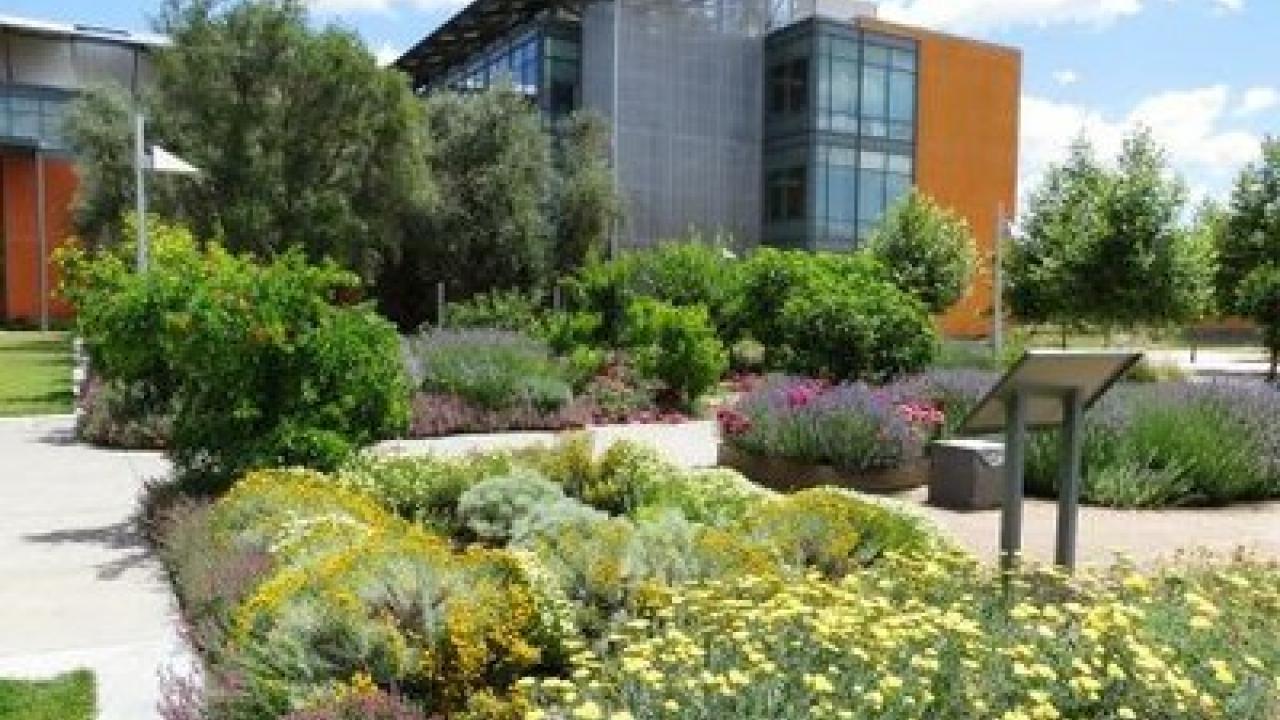
April 26, 2013: Luncheon in the Garden
Focusing on promoting creative use of honey, the Center is preparing for a unique fund raising Luncheon in the Garden, Sunday afternoon, June 2. Chefs from Northern California and Davis will share their culinary skills by creating a five course meal using honey – both savory and sweet – in each dish prepared.
Mani Niall, visionary chef of the day and owner of Sweet Bar Bakery in Oakland explains, ‘We want this luncheon to be a celebration of the versatility of honey!’ Mani will be making the dessert course, an elegant caramelized almond napoleon with honey whipped mascarpone. Chef Charlie Ayers, creator of the Google food complex in Silicon Valley and presently Executive Chef at Calafia in Palo Alto is making honey braised lamb shoulder with fennel and padron peppers.
The luncheon will be held in the Good Life Garden at the Robert Mondavi Institute at the UC Davis campus. Diners will be surrounded by flowering fruits and vegetables featuring the bounty of the California Valley. Other chefs providing creative fare include Pru Mendez of Tucos, Cullen Newhoff, Executive Chef of Seasons and Sean Flannery, chef at Whole Foods, all of Davis. Gordon Hull of Heidrun Meadery in Point Reyes will pour sparkling Mead as guests enter the beautiful grounds.
Amina Harris, Executive Director of the Honey and Pollination Center says that ‘a major goal is to educate consumers about the wonderful varieties of honey. This luncheon is a tasty way to get people excited about using honey in a myriad of ways.’
Harris explains further that most ‘people think honey is just honey. Each floral source creates a unique flavored honey – that’s why we have Yellow Star thistle from Northern California, Orange Blossom from Southern California dn thousands of others that represent their native habitats.’ Harris continues, ‘Not only does each honey taste radically different, even the same floral source can taste different!. For example, Orange Blossom from Southern California is light in color, low in moisture and has a flowery bouquet. Orange Blossom Honey from Florida reflects its more tropical environment. The honey has a very similar taste and smell, but the color is darker and the texture is thicker.”
The Center has recently received funding for the development of a honey tasting and aroma wheel which will be designed to help honey consumers be able to give words to the different flavors they discover when tasting honey. ‘I suspect it will take us about a year or so before the wheel is complete,’ says Harris. ‘We want to include as many people as possible as we look at and taste the different varieties of honey. We will start with those in California and hope to have the California State Beekeepers and local bee clubs sharing their expertise as we develop the wheel.’ Funding for this year long program has come from the College of Agriculture and Environmental Sciences at the University of California, Davis; The California Farm Bureau and the Department of food Science and Technology, also at the University.
Just a little over 6 months old, the Center held its first conference last fall, ‘The Bounty of Pollination’, featuring each aspect of the Center’s lofty goals. Speakers addressed the need for a greater understanding of pollination and creative ways to address our country’s need for diverse pollinators. In addition, Louie Schwartzberg, director of the UTubeTED talk ‘Beauty of Pollination’ addressed the group and introduced his coming full length film, “Wings of Life” narrated by Meryl Streep.
Plans for the future include the development of education programs for beekeepers of all ages and skill levels from 4H to the possible creation of a master beekeeping certificate. Next spring the Honey and Pollination Center plans to hold a Mead making Seminar in coordination with the Department of Viticulture and Enology at the University in order to help the growing number of mead makers understand the science and make better and better mead.
